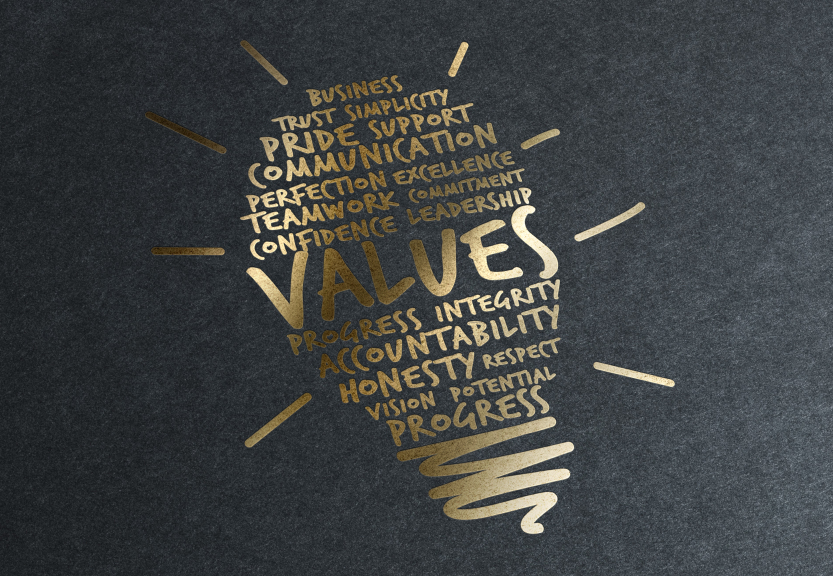Integrity: What’s Up With That?
Integrity, like trust, is something we all talk about, meaning many different things – but always assuming that everyone else means precisely the same that we do. That leads to vagueness and confusion at best – and angered accusations at worst. Particularly in this time of elections, a careful examination of how we use the words in common language is useful.
Integrity and the Dictionary
Merriam Webster says it’s “the quality of being honest and fair,” and/or “the state of being complete or whole.”
If you’re into derivations of words (as I am), then it’s the second of these definitions that rings true. The root of “integrity” is Latin, integer. That suggests the heart of the matter (integral), and an entirety. “Integer” also has the sense of a non-fractional number, i.e. whole, not fragmented, complete.
In manufacturing, we have the idea of “surface integrity,” the effect that a machined surface has on the performance of the product in question: integrity here means keeping a package of specified performance levels intact. Similarly, a high-integrity steel beam is one that will not break or otherwise become compromised within certain parameters of stress.
Related also to this theme of wholeness is the idea of transparency, of things being whole, complete, not hidden – in this sense, we have high integrity to the extent we appear the same way to all people. Think of the phrase “two-faced” as an example of someone without integrity. (For a somewhat different and nuanced take on this issue in cyberspace, see @danahboyd on Mark Zuckerberg and multiple online identities).
Sometimes when we say someone has integrity, we mean they act consistently, in accord with principles. We say someone has high integrity when they stick to their guns, even in the face of resistance or difficulty.
Which raises an interesting question: where’s the line between integrity and obstinacy? For that matter, can a politician who believes passionately in the art of compromise ever be considered to have high integrity?
Then there’s that other common use of integrity that has a moral overtone – honorable, honest, upright, virtuous, and decent. Some of it has to do with truth-telling; but some of it has to do with pursuing a moral code.
Yet that raises another interesting question: can a gang member or a mafioso be considered to have integrity? Can an Occupy person ever consider a Wall Streeter to have integrity? Or vice versa? There may be honor among thieves, but can there be integrity?
Integrity – Your Choice?
So which is it? Does integrity mean you tell the truth? Does it mean you operate from values? Does it mean you always keep your word? Does it mean you live a moral life? Does it mean your life is an open book?
Let’s be clear: there is no “right” answer. Words like “integrity” mean whatever we choose to make them mean; there is no objective “meaning” that exists in a way that can be arbitrated.
But that makes it even more important that we be clear about what we do mean. It just helps in communication.
For my part, I’m going to use “integrity” mainly to mean whole, complete, transparent, evident-to-all, untainted, what-you-see-is-what-you-get.
For other common meanings of “integrity,” I’m going to stick with synonyms like credible or honest; or moral and upright; or consistent.
What do you mean when you think of integrity?




I think it might be necessary to quote Humpty Dumpty at this point…
I once heard integrity described as doing the right thing even when nobody is watching. It is about values and standards. It is about being counted on. Einstein taught us about perspective, the importance of relativity. Each perspective has its own measurements and we can’t take measurements from one perspective and use them in another.
Values and standards are such a yardstick. Some people think integrity is about doing the same thing consistently. We think counting on someone is about prediction, being able to predict their behavior. But, context, the ongoing changing perspective, is dynamic.
Its why, in a social context, we have rules, like laws. We can’t have people running around killing each other. So you might adhere strictly to a “do not kill” philosophy. However, if a terrorist, is standing over your child with a machete and you have a gun in hand, he just brought a knife to a gun fight. The context suddenly wasn’t about “social” standards and values, nut a personal set, measurements from a different perspective. Our courts measure based on context, agreeing with us.
Integrity is about using the right criteria as a yardstick, based on context. If I can count on that, I will trust decisions made when I am not there to watch.
I once heard integrity described as doing the right thing even when nobody is watching. It is about values and standards. It is about being counted on. Einstein taught us about perspective, the importance of relativity. Each perspective has its own measurements and we can’t take measurements from one perspective and use them in another.
Values and standards are such a yardstick. Some people think integrity is about doing the same thing consistently. We think counting on someone is about prediction, being able to predict their behavior. But, context, the ongoing changing perspective, is dynamic.
Its why, in a social context, we have rules, like laws. We can’t have people running around killing each other. So you might adhere strictly to a “do not kill” philosophy. However, if a terrorist, is standing over your child with a machete and you have a gun in hand, he just brought a knife to a gun fight. The context suddenly wasn’t about “social” standards and values, nut a personal set, measurements from a different perspective. Our courts measure based on context, agreeing with us.
Integrity is about using the right criteria as a yardstick, based on context. If I can count on that, I will trust decisions made when I am not there to watch.
Charlie,
I like the nuance you posited that integrity is about wholeness and completeness. In terms of this discussion it would be that I (or anyone) is living in alignment with my values. It means keeping commitments, even with ourselves (sometimes the hardest).
To your question yes a gang member can be in integrity. And a deacon of the church can be out of integrity if they are not living and behaving in congruence with values and beliefs.
Be well,
John
Charlie,
I like the nuance you posited that integrity is about wholeness and completeness. In terms of this discussion it would be that I (or anyone) is living in alignment with my values. It means keeping commitments, even with ourselves (sometimes the hardest).
To your question yes a gang member can be in integrity. And a deacon of the church can be out of integrity if they are not living and behaving in congruence with values and beliefs.
Be well,
John
I think it might be necessary to quote Humpty Dumpty at this point…